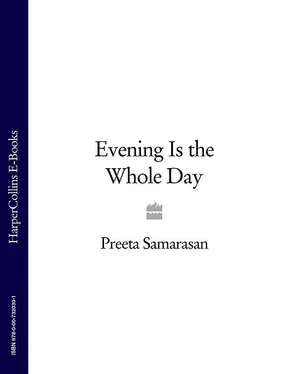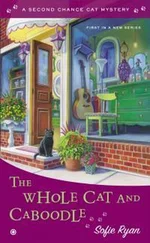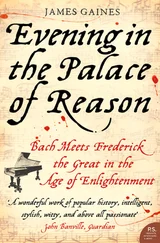With one foot Appa sweeps a few dead leaves and stray pebbles out under the gate. Then he turns and makes his way back to the house, dragging his Japanese slippers on the gravel. For a few seconds he stands looking up at the tops of trees as if he were a visitor admiring the lush foliage, his umbrella turning like a Victorian lady’s parasol on his shoulder. Wah, wah, Mr. Raju, very nice, man, your garden! What kind of fertilizer you use? “Big-House Uncle!” shouts Baldy from the top of his tree next door. “Uncle, Uncle, Big-House Uncle! Uncle ah! Uncle where? Uncle why?” Appa looks right at Baldy but says nothing. Then, as if he’s suddenly remembered something important, he starts and strides briskly into the house.
“What are you two sitting there wasting time for?” he asks Suresh and Aasha as he enters the dining room. “As if the whole family must sit and bid a solemn farewell to the bloody girl like she’s the Queen of England on a state visit. Go and do your homework or read a book or do something useful, for heaven’s sake.”
The children’s heads turn towards Amma, and they sit holding their breath and biting their lips, waiting for her permission. To go and do their homework (although Aasha doesn’t really have any). To read a book. To do unnamed useful things. To scamper off and live children’s lives (or to discover that such a thing has become impossible for them, even after the morning’s promise of a new beginning) and leave Amma bereft at a crumb-scattered table, with no audience.
“What? What are you looking at me for?” says Amma. “As if I wanted you to sit here. Both of you sitting with your busybody backsides glued to your chairs as if this whole tamasha is a Saturday morning cartoon, and now looking at me as if I’m the one who wouldn’t let you go.”
A tiny gust of air escapes Appa’s nostrils. A laugh, a snip of surprise, a puff of fear. Good grief , Appa thinks, it’s true: she’s kept them here to witness her righteous fury at Chellam the Ingrate. And not just to witness it—to share it, to catch the whole rolling mass of rage with nowhere else to go, to parcel it out for future use. Lesson One: how some people turn against you even After Everything you’ve done for them.
He unfolds the two-color map of his wife in his head and adds to it another little landmark, a white dot before the border. Call it Shamelessness. Call it Stopping-at-Nothing, a triple-barreled name for a quaint English village. From the pit of his belly his own ravaging shamelessnesses threaten to rise in twos and threes and fours into his chest, waiting to accuse him in their discordant voices of calling the kettle black, waiting for him to acknowledge that the children have been caught between his old shamelessnesses and her new ones. He blinks and swallows, and thinks instead of the children’s pause for permission. That’s what has really jolted him, not this sudden change in his wife. That’s what has sent cold air spiraling out his nostrils in two swift exclamation points. She’s kept them here , he thinks, and they know it . For some reason he can’t put his finger on, this frightens him. His head swims a little, as if he’s just woken from a dream in which chickens talked and suns turned into moons.
He shakes his head and strides past them to calm his nerves with a cool shower in a bathroom humming with the ghost of his dead mother, before driving off the screen into an alternate universe in which he can forget the intransigent truths of this one.
In the kitchen Amma puts the dishes in the sink, and says, without turning around, “Next time why don’t you just go with your father on Lourdesmary’s days off? You want me to plan each Saturday night dinner one week in advance or what? Write out a full dinner menu with a fountain pen? Wear white gloves to serve you from silver trays?” Then she goes up to her room and stays there until Suresh and Aasha have made and eaten a dinner composed of Emergency Rations: golden syrup on Jacob’s Cream Crackers, Milo powder straight from the tin, raw Maggi noodles broken into pieces and sprinkled with their grey (chicken-flavored) seasoning powder. At eight o’clock, Amma comes downstairs to eat her own dinner while listening to the kitchen radio in the half-dark. The radio’s still set to the Tamil station to which Chellam used to listen while combing Paati’s hair in the mornings. The theme song for the ten o’clock film-music program would always come on just as she pulled Paati’s hair into a silky white knot barely big enough for two hairpins. Now, though, there’s only a man with a gravelly, black-mustachioed voice interviewing a young lady doctor about the health benefits of almonds.
Suresh ceremoniously lays out his books and pencils, then takes his HB pencil and ruler out of their metal tin and starts his mathematics homework. “Please can I have just —” Aasha begins, and Suresh tears her a sheet of foolscap from his scrap paper pad and gives her a blue rollerball pen with a fat nib. On this cadged piece of paper Aasha draws an elaborate picture indecipherable to everyone but herself, a picture of Chellam the ex–servant girl, once beloved (but hated) and hated (but beloved) by Suresh and Aasha, now in ex-ile in her faraway village of red earth and tin roofs.
Ex-ile is an island for people who aren’t what they used to be. On that lonely island in Aasha’s picture Chellam wanders, tripping on blunt rocks in barren valleys, scaling sharp, windblown slopes on her hands and knees, minding starved cows that graze on rubbish heaps as if they’re mounds of fresh clover. Blindly arranging and rearranging clouds of dust and dirt and bloodstained bathroom buckets with a ragged broom. Inside her head a dozen snakes lie coiled around one another in a heavy mass. Inside her belly stands a tiny matchstick figure, a smaller version of herself, pushing against the round walls of its dwelling with its tiny hands.
This matchstick representation of Chellam is accurate in at least one respect: there is indeed a terrible colubrine knot of bad memories and black questions inside Chellam’s head that will die with her, unhatched. Aasha outlines the snakes again and then colors and colors them till the ink spreads down into Chellam’s heavy-lobed, oversized ears.
“ Tsk , Aasha,” grumbles Suresh, “wasting my good pen only. For nonsense like that can’t you use a pencil?”
Aasha caps the pen and rolls it across the table to Suresh with a pout. She climbs down from her chair and goes upstairs to sit in Uma’s empty room. Around her the night sings with crickets and cicadas, with creaky ceiling fans and the theme songs of all the television programs being watched all the way down Kingfisher Lane. Hawaii Five- O. B.J. and the Bear. Little House on the Prairie . Aasha’s quivering ears make out each one, separating them like threads on a loom, but downstairs she hears only silence. The silence, too, can be teased apart like threads: the silence of Amma staring out the kitchen window into the falling darkness. The silence of Appa’s empty study, from which there are no rustlings of papers or whistlings of tunes. The silence of Suresh doing his homework all alone, feeling guilty for grumbling about his wasted pen. The silence of Paati, whose weightless, see-through body bumps noiselessly into furniture and walls, looking for the unraveling rattan chair on which she once sat all day in her mosquito-thronged corner. Merciful flames have freed the chair’s spirit just as Paati’s cremation freed hers, but the chair hasn’t reappeared to sit transparently in its corner, and Paati is inconsolable. Her clear-glass joints creak silently as she settles onto the floor where her chair used to be.
A small voice outside the window says: “That’s how Paati knows she’s dead. Her chair isn’t there anymore.” Aasha turns to see her oldest (yet very young) ghost friend perched on the wide windowsill, tilting her head as she sometimes does. If Aasha were tall enough and strong enough to open this window on her own she would, though Mr. McDougall’s daughter’s not asking to be let in this time.
Читать дальше












